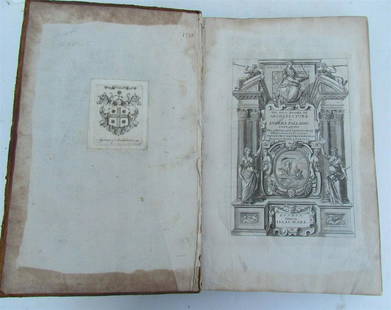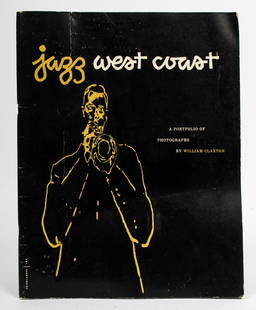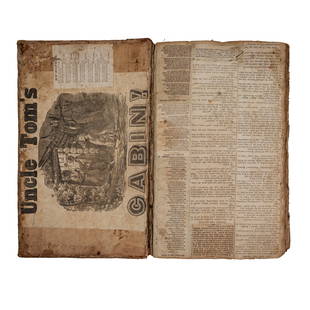
1780 The Praise of Folly Stultitiae Laus or Moriae Encomium antique ILLUSTRATED
Similar Sale History
View More Items in Books




Related Books
More Items in Books
View MoreRecommended Books, Magazines & Papers
View More













Item Details
Description
Moriae encomium [title in Greek] sive stultitiae laus Des. Erasmi Rot. Declamatio Cum commentariis Gerardi Listrii, ineditis Oswaldi Molitoris, et figuris Johannis Holbenii ERASMUS, DESIDERIUS Published by typis G. Haas, ex officina J.J. Thurneisen, Basel, 1780 8vo (5 by 7 3/4") pp. [16],355; 83 woodcut illustrations in the text all after Holbein; full calf. First edition to contain all 83 of the illustrations cut in wood by Heinrich Heitz, after marginal drawings by Hans Holbein and his brother Ambrose and perhaps two other unknown artists, in a copy of the Basil (1515) edition. Very good interior condition , minor wear of binding, repaired spine, covers with inside of endpapers repairs. 2 bookplates at the front Text in Latin -------------------------- In Praise of Folly, also translated as The Praise of Folly (Latin: Stultitiae Laus or Moriae Encomium), is an essay written in Latin in 1509 by Desiderius Erasmus of Rotterdam and first printed in June 1511. Inspired by previous works of the Italian humanist Faustino Perisauli [it] De Triumpho Stultitiae, it is a satirical attack on superstitions, other traditions of European society and on the Western Church. Erasmus revised and extended his work, which was originally written in the space of a week while sojourning with Sir Thomas More at More's house in Bucklersbury in the City of London. The title Moriae Encomium had a punning second meaning as In Praise of More. In Praise of Folly is considered one of the most notable works of the Renaissance and played an important role in the beginnings of the Protestant Reformation. In Praise of Folly begins with a satirical learned encomium, in which Folly praises herself, in the manner of the Greek satirist Lucian (2nd century AD), whose work Erasmus and Sir Thomas More had recently translated into Latin; it then takes a darker tone in a series of orations, as Folly praises self-deception and madness and moves to a satirical examination of pious but superstitious abuses of Catholic doctrine and corrupt practices in parts of the Roman Catholic Church—to which Erasmus was ever faithful—and the folly of pedants. Erasmus had recently returned disappointed from Rome, where he had turned down offers of advancement in the curia, and Folly increasingly takes on Erasmus' own chastising voice. The essay ends with a straightforward statement of Christian ideal: "No Man is wise at all Times, or is without his blind Side." Hans Holbein's witty marginal drawing of Folly (1515), in the first edition, a copy owned by Erasmus himself (Kupferstichkabinett, Basel) Erasmus was a good friend of More, with whom he shared a taste for dry humor and other intellectual pursuits. The title Moriae Encomium could also be read as meaning "In praise of More". The double or triple meanings go on throughout the text. The essay is filled with classical allusions delivered in a style typical of the learned humanists of the Renaissance. Folly parades as a goddess, offspring of Plutus, the god of wealth and a nymph, Freshness. She was nursed by two other nymphs, Inebriation and Ignorance. Her faithful companions include Philautia (self-love), Kolakia (flattery), Lethe (forgetfulness), Misoponia (laziness), Hedone (pleasure), Anoia (dementia), Tryphe (wantonness), and two gods, Komos (intemperance) and Nigretos Hypnos (heavy sleep). Folly praises herself endlessly, arguing that life would be dull and distasteful without her. Of earthly existence, Folly pompously states, "you'll find nothing frolic or fortunate that it owes not to me." Moriae Encomium was hugely popular, to Erasmus' astonishment and sometimes his dismay. Even Erasmus' close friends had been initially skeptical and warned him of possible dangers to himself from thus attacking the established religion. Even Leo X and Cardinal Cisneros are said to have found it amusing. Before Erasmus' death it had already passed into numerous editions and had been translated into Czech, French, and German. An English edition soon followed. It influenced the teaching of rhetoric during the later sixteenth century, and the art of adoxography or praise of worthless subjects became a popular exercise in Elizabethan grammar schools. A copy of the Basel edition of 1515/16 was illustrated with pen and ink drawings by Hans Holbein the Younger. These are the most famous illustrations of In Praise of Folly. Its role in the beginnings of the Protestant Reformation stem from the foundation of critique which the essay laid against the practices of the Church and its political allies.
Topic:
Europe
Binding:
Leather
Subject:
Illustrated
Language:
Latin
Original/Facsimile:
Original
Year Printed:
1780
Reserve: $245.00
Shipping:Domestic: Flat-rate of $25.00 to anywhere within the contiguous U.S. International: Foreign shipping rates are determined by destination. Combined shipping: Please ask about combined shipping for multiple lots before bidding. Location: This item ships from Pennsylvania.
Your purchase is protected:
Photos, descriptions, and estimates were prepared with the utmost care by a fully certified expert and appraiser. All items in this sale are guaranteed authentic.
In the rare event that the item did not conform to the lot description in the sale, Jasper52 specialists are here to help. Buyers may return the item for a full refund provided you notify Jasper52 within 5 days of receiving the item.
Topic:
Europe
Binding:
Leather
Subject:
Illustrated
Language:
Latin
Original/Facsimile:
Original
Year Printed:
1780
Reserve: $245.00
Shipping:
Your purchase is protected:
Photos, descriptions, and estimates were prepared with the utmost care by a fully certified expert and appraiser. All items in this sale are guaranteed authentic.
In the rare event that the item did not conform to the lot description in the sale, Jasper52 specialists are here to help. Buyers may return the item for a full refund provided you notify Jasper52 within 5 days of receiving the item.
Condition
--
Buyer's Premium
- 15%
1780 The Praise of Folly Stultitiae Laus or Moriae Encomium antique ILLUSTRATED
Estimate $300 - $350
1 bidder is watching this item.
Shipping & Pickup Options
Item located in Pennsylvania, US$25 shipping in the US
Payment
Accepts seamless payments through LiveAuctioneers
See More Items From This Jasper52 Seller

TOP

























![1893 CHARLES DARWIN SELECTED WORKS 15 VOLUMES antique ILLUSTRATED #147/1000: Selected Works of Charles Darwin New York and London, Appleton and Company; [1893] 15 volumes. With engraved frontispieces, plates, some folding, captioned tissue guards, title pages printed in red an](https://p1.liveauctioneers.com/5584/291259/154274001_1_x.jpg?height=310&quality=70&version=1686144622)













![1906 HISTORY of JAPAN & KINGDOM of SIAM Thailand 3 VOLUMES antique ILLUSTRATED: THE HISTORY OF JAPAN TOGETHER WITH A DESCRIPTION OF THE KINGDOM OF SIAM 1690-92. Glasgow: James Maclehose and Sons, 1906 3 volumes, complete by Engelbert Kaempfer 8vo: 6 by 9" pp. lxxxix, [3], 336, [3](https://p1.liveauctioneers.com/5584/328415/176935111_1_x.jpg?height=310&quality=70&version=1715112425)

![1774 NATURAL HISTORY by BUFFON 21 volumes antique ILLUSTRATED w/ 284 PLATES: BUFFON, Georges-Louis Leclerc de (1707-1788) OEUVRES COMPLÈTES [...]. Paris; 1774-1782 21 (of 25) volumes 1774-1778 (vol. 1-19), 1782 (vol. 20-21) Size:3 3/4 by 6 3/4" frontispiece with portrait](https://p1.liveauctioneers.com/5584/328415/176935232_1_x.jpg?height=310&quality=70&version=1715112425)
![1917 ARTIFICIAL DYE-STUFFS by ALBERT RAMSEY & CLAUDE WESTON antique ILLUSTRATED: ARTIFICIAL DYE-STUFFS by ALBERT RAMSEY & CLAUDE WESTON London; 1917 Size 5 3/4 by 8 3/4" vi, [4], 212 pp Original cloth Very good condition, minor wear of binding Ex-library Text in English Reserve: $](https://p1.liveauctioneers.com/5584/328415/176935275_1_x.jpg?height=310&quality=70&version=1715112425)




![1761 ADVENTURES of ROBINSON CRUSOE by DANIEL DEFOE 3 volumes antique ILLUSTRATED: [De FOE (Daniel)] La Vie et les avantures surprenantes de Robinson Crusoe [...]. A Paris, Chez Cailleau, Dufour et Cuissart, 1761 6 parts in 3 volumes (with continued pagination) Size 4 by 6 3/4" tota](https://p1.liveauctioneers.com/5584/328415/176935319_1_x.jpg?height=310&quality=70&version=1715112425)








![19 issues of rare Gay Magazine METRA 1985-1986: [Queer interest], Metra: Midwest America's Leading Free Gay Magazine, 19 issues, published 1986-1987, a few duplicates, softcover, staplebound wraps, illustrated throughout in black and white, publish](https://p1.liveauctioneers.com/184/328649/177016396_1_x.jpg?height=310&quality=70&version=1714770323)






















